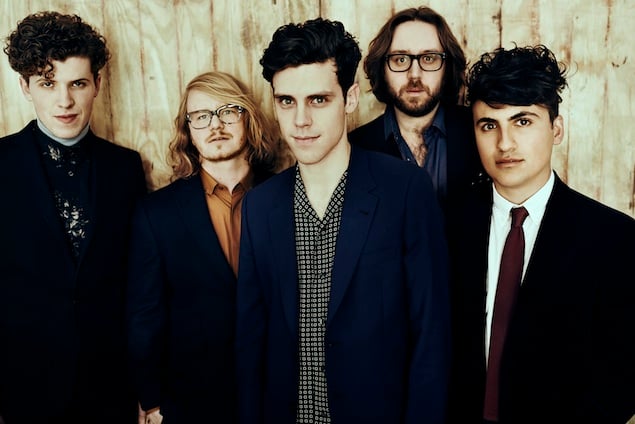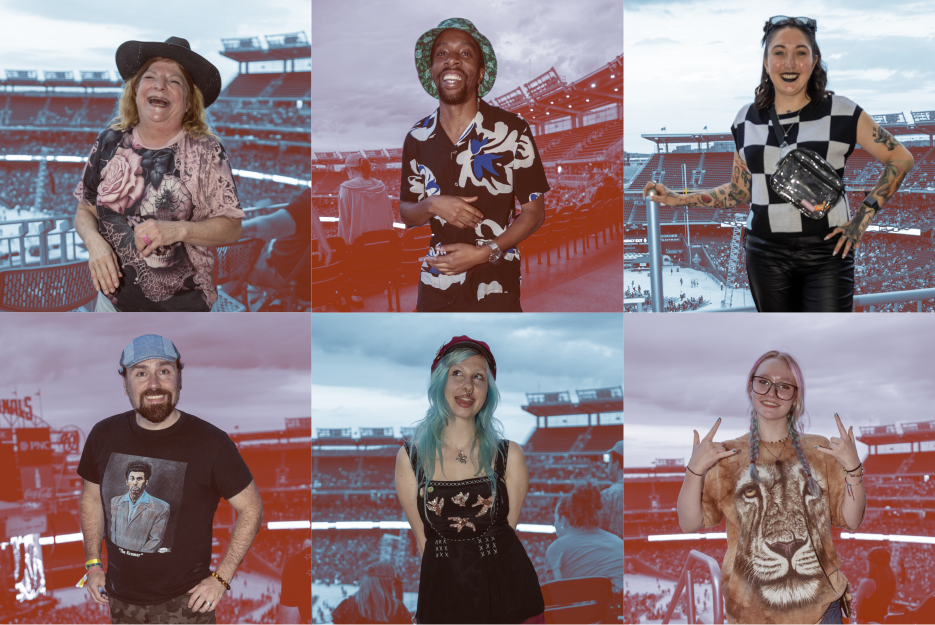Your first relationship. The devastation of your first real breakup. Those long, hazy nights of feeling invincible with your friends. And the moment you discover that somewhere along the way your friends started growing up—sometimes without you. For a certain kind of twentysomething, English indie folk rockers Noah and the Whale practically wrote the soundtracks to all those life events. Their debut album, Peaceful, the World Lays Me Down, was a twee celebration of young love, inspired by frontman Charlie Fink’s relationship with then-band member Laura Marling. Their breakup begat 2009’s melancholy The First Days of Spring. And with their fourth album, May’s Heart of Nowhere, they capture that nebulous, bittersweet realization that you’re becoming an adult whether you’re ready for it or not.
Over the years, the band’s roster has changed a few times; the current members are Fink, violinist/keyboard player Tom Hobden, bassist Matt Owens, guitarist Fred Abbott, and drummer Michael Petulla, who joined after 2011’s Last Night on Earth. They’re currently on tour in support of Heart of Nowhere, including a stop at 9:30 Club. We caught up with Hobden to discuss the band’s writing process, their experiences on the festival circuit, and their evolution as musicians and as individuals.
What are you up to today?
I’m in London, still at home; we kick off the tour next week. We’ve got a few little things going on—we’ve had quite a busy summer doing the festival circuit, festivals in the UK and Europe. There have been some really, really good ones, and some quite strange ones I wouldn’t have expected to be good but turned out well. We did the Positivus festival in Latvia, and we turned up and realized we were headlining! At Glastonbury we had an amazing set, at 6 PM on Saturday. It was glorious; that was quite a moment for us. We had a really big crowd.
You just finished up a string of shows called Month of Sundays—what’s the idea behind that?
It was a tour focused on four London shows in West End Palace Theatre, so we had it every Sunday. It was really cool, and worked really well actually—I could kick back and watch a movie, and then get up when it was time for the band to come on. It was my ideal gig, really.
You released your fourth album a few months ago—how do you think your sound has progressed since the first album?
It’s been interesting. When we were making it we were looking for a sound that best represented what we were doing live at the time, and other albums were quite different-sounding, so it was quite a challenge to figure out how to best perform those songs at our gigs. Now we’ve found a kind of common, binding sound, so we thought, Why not try to translate that to a record? We decided very early on to make a live album. Sometimes so much focus is on production and production value, but all our favorite records have been recorded live. It’s quite a fun way to write a song in the first place.
Heart of Nowhere seems to be about that feeling of being in your twenties and thinking life is starting to move really fast.
Absolutely; I think about it all the time. It’s about a kind of common . . . a malaise, a sentiment you have when you get to this age that’s kind of looking for direction. In your teenage years don’t have any responsibilities, so you can just do what you want. Some of the tracks focus on losing touch with friends, which is open-ended, whether it’s in a touring band or you’re working and don’t have enough time to socialize. It was inspired by an actual instance when one of Charlie’s friends got engaged and is about to get married, and that was quite a shock. We live in a world of instant communication, but you can still lose touch with people.
What was the process of making it like?
We spent quite a bit of time writing; we went to a synagogue in east London, and were in this huge room that was a really good space to set up all the gear and not worry about unpacking everything every day. Then we had to get out of the city; it’s too much distraction when you’re in that space going home every day and being out with friends and family. So we went out to Essex to this tiny island called Osea Island off the coast, which is only accessible by a causeway. We were trying to strand ourselves, and it was this weird kind of English countryside . . . it was very peaceful and very productive. The weather was pretty abysmal, and there were only five or six buildings on island; we must have written at least five songs.
Then we started touring, which was quite disruptive, but we found a window in summer of last year to go to the south of France and spend two weeks there doing writing. That was beautiful weather, and there was amazing food and good wine. Then we recorded back in London in this wicked space, really high-tech, this very beautiful wooden room. It had amazing acoustics, and since we’re recording live, that was great—so we were doing one track a day, just mucking about.
Between writing and touring, is there one you prefer?
I see my life as being split into three very clear-cut stages—touring, writing, and recording—and you very much yearn for the next phase all the time. But it’s important to kind of live in the moment as well. Sometimes you get a bit frustrated when you’re touring for a good amount of time; we toured for 20 months, and it gets to a stage where you’re dying to get on to writing the next album. But the interest is always there, and you know the next stage is not far off.
The band has gone through a few configurations of members; has that changed the dynamic?
It’s changed a lot. We started as Charlie and myself and Doug [Fink, Charlie’s brother] on the drums, and then there was a big upheaval between the second and third albums when Doug left to pursue a career in medicine. At that stage I remember being uncertain about things, and we didn’t have a proper drummer up until two years ago when Mike joined the band. And then our third album was a marked difference from the melancholy of that second breakup album. It was such a great feeling to have a guitarist [Fred Abbott] who fleshed out our sound for the much more poppy third album. And we couldn’t have done a live album with anything less than two guitars, because it adds these layers.
Are you ever surprised by the direction the band has developed in?
I think we’ve always been that kind of band; musically, we’ve never really sat still, and I think it’s quite apparent when you listen to our albums. That’s just the way we are as people. Every day is a surprise—the prospect of having released four records is quite a thought. I think it’s about being ever hungry really; if you find yourself with a bit of time off, you keep pressing and don’t get slack. I don’t like taking breaks.
Noah and the Whale perform at 9:30 Club Wednesday, October 16, at 7 PM. Tickets ($25) are available online.















